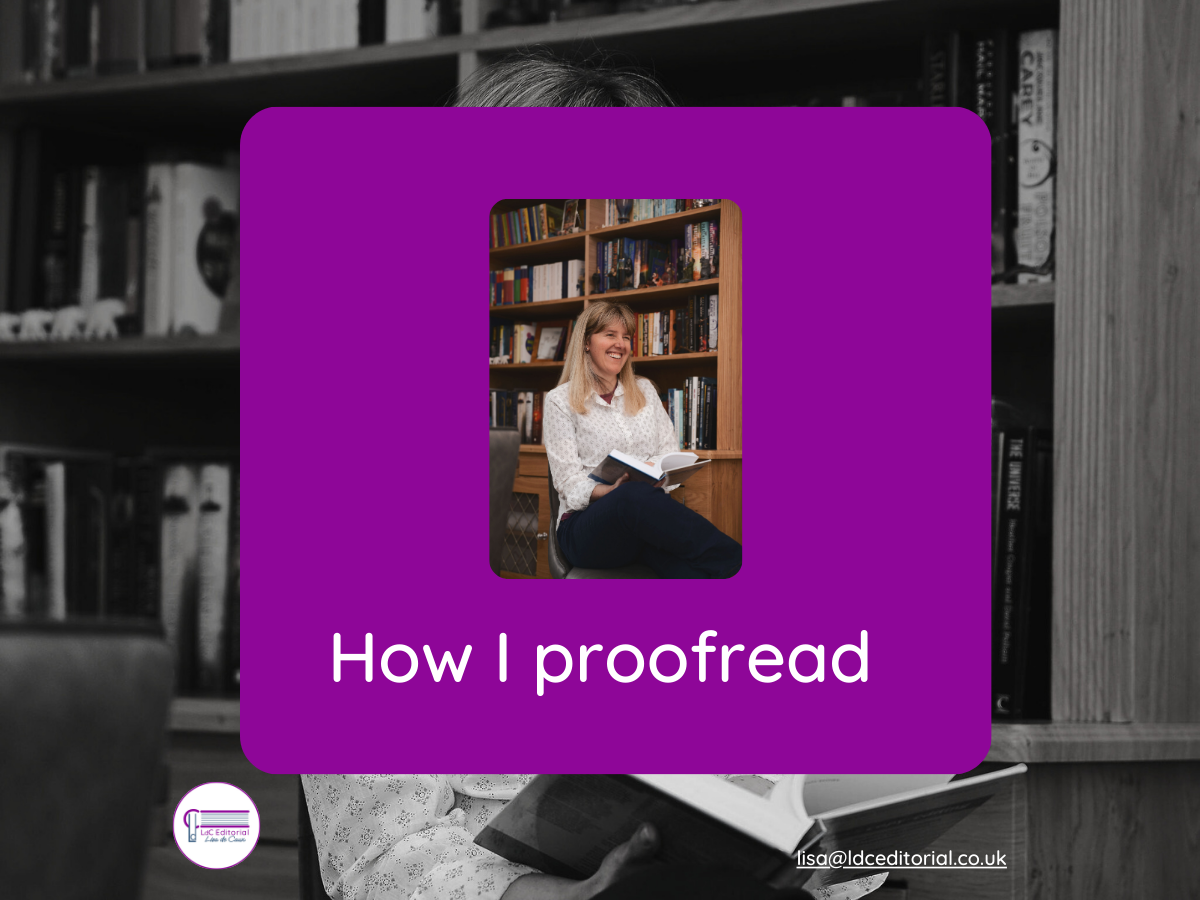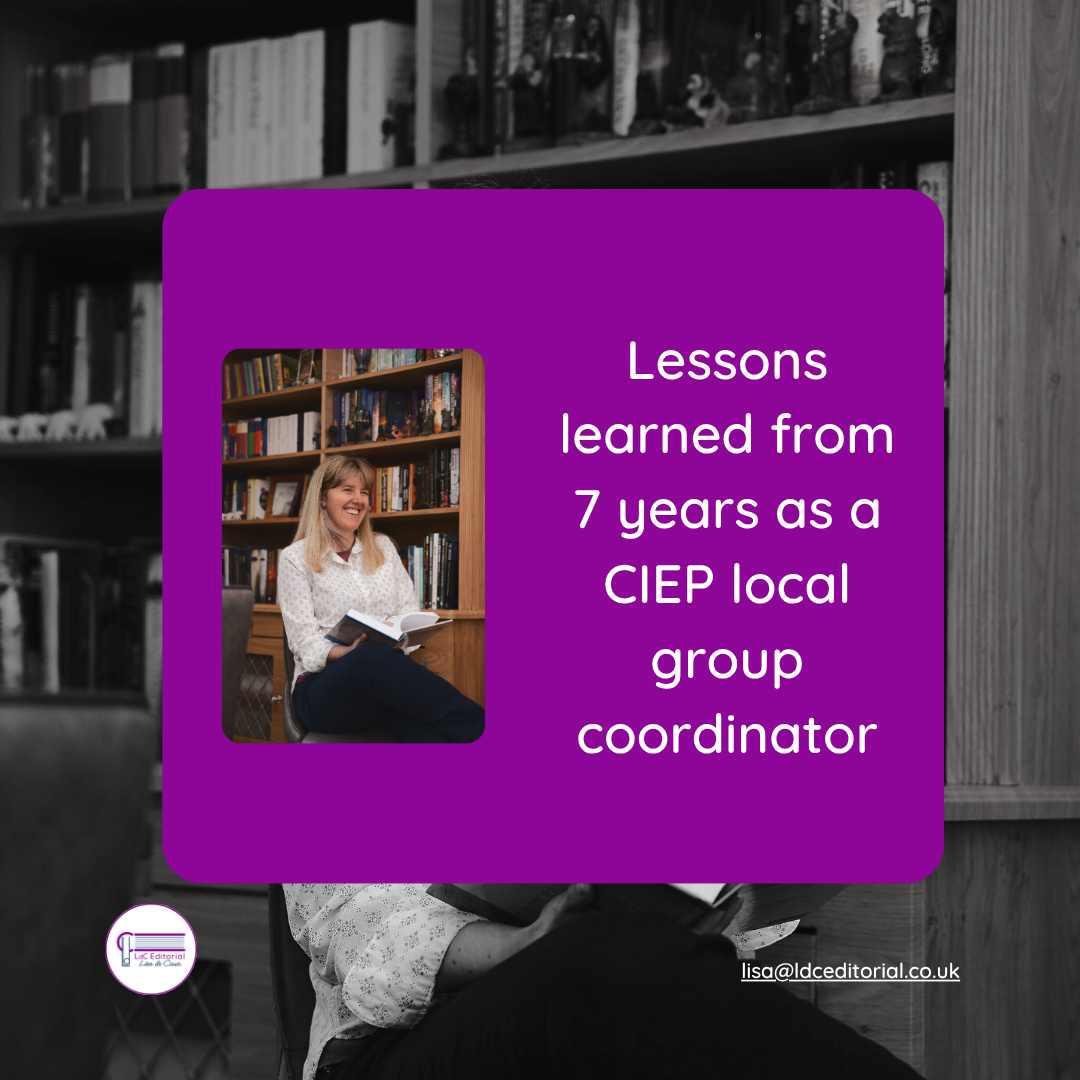My pathway to becoming a freelance proofreader
Lisa de Caux • 24 July 2019
My pathway to becoming a freelance proofreader

When I said that I would talk about my pathway to freelancing at a Society for Young Publishers
event, I needed to stop and think – how did it come about? That thought process led to this blog.
It is also fairly recent.
I’d been a chartered accountant for many years before I became a proofreader.
The sort of event that makes you stop and take stock
I researched my options at work. There was a new organisation structure for my department: new jobs were created and responsibilities changed. Did I want to apply for one of the new jobs? Were they offering voluntary redundancy? What happened if I simply didn’t apply for one of the jobs that were available?
I knew that this wouldn’t simply mean redundancy, it was probably going to lead to a career change as well, and I had to take some time to reset my mind and get used to everything.
To start with, I was focused on what kind of employment I might find. I hadn’t thought of running a business.
In 2015, my little girl had just turned four and I was working as a part-time internal audit manager for a major food retailer.
And we were about to have an organisational transformation. I knew what that meant. I’d been there before.
It meant all sorts of positive things for the business, but for me, on a personal level, it meant uncertainty, stress and probably reapplying for my job.
It was the sort of event that makes you stop and take stock of your situation, and think about what decisions you can make.
Is it time for a change?
The time seemed right for a change. My daughter would start primary school later that year, and I’d looked at work-life balance in a different way since she’d been born.
Over the years, career change had crossed my mind. I’d gone so far as to buy a book on proofreading at one stage... I wondered if I should consider it more seriously this time.
I spent a lot of time thinking about it – I talked to friends and family. My husband and I talked about what it could mean for us and our daughter.
In the end I simply had to make a decision.
I knew I’d made the right decision when my redundancy took effect in the same week that my little girl started primary school.
Thinking about a career change
So I did that. I helped my daughter settle into primary school. I baked a lot. My banana bread is pretty good now…
And then I investigated various ideas for earning a living. I knew that I wanted something that would give me a better work-life balance and allow me to carry on doing the school drop off and pick up for my little girl.
And I kept coming back to proofreading. My degree had been in English Literature and I’d never lost my love of words and reading. I read that proofreading book again – some of it was out of date, but the general principles were clear. I decided that this was the option that I needed to explore in more depth.
In 2016, I had two lightbulb moments.
Lightbulb moment 1 – the Society for Editors and Proofreaders
The first was discovering the Chartered Institute of Editing and Proofreading (CIEP – then SfEP).
You can attend three local group meetings before becoming a member. That was the Manchester local group for me.
I went along to a meeting, discovered this vibrant community, and knew that I wanted to be a part of it. As a bonus, the CIEP had so many useful resources to share that would help with getting started.
Lightbulb moment 2 – the New Enterprise Allowance
The second lightbulb moment was when a friend said that she thought the NEA with the Job Centre would suit me. The NEA turned out to be the New Enterprise Allowance.
If I qualified, the allowance would help me with starting a proofreading business.
Could I run my own business?
For me, proofreading would mean embracing everything that would be required for running my own business.
I’d never thought I was the entrepreneurial type, but I was keen to explore it, and I knew I’d learnt a lot about how to run business over my years as an accountant.
It was a major mindset shift. When you’re a sole trader you are the CEO, you personally provide the service to your clients, and you are your own support team (finance, IT, marketing, governance, HR, etc).
I was lucky that my husband is an IT consultant and he’d be able to help me with all my technical requirements, including security, backups and disaster recovery.
Marketing was the area where I had no experience, and I knew I’d have to learn a lot about it (more of that for another blog).
Lightbulb moment 1 – the Society for Editors and Proofreaders
The first was discovering the Chartered Institute of Editing and Proofreading (CIEP – then SfEP).
You can attend three local group meetings before becoming a member. That was the Manchester local group for me.
I went along to a meeting, discovered this vibrant community, and knew that I wanted to be a part of it. As a bonus, the CIEP had so many useful resources to share that would help with getting started.
Lightbulb moment 2 – the New Enterprise Allowance
The second lightbulb moment was when a friend said that she thought the NEA with the Job Centre would suit me. The NEA turned out to be the New Enterprise Allowance.
If I qualified, the allowance would help me with starting a proofreading business.
Could I run my own business?
For me, proofreading would mean embracing everything that would be required for running my own business.
I’d never thought I was the entrepreneurial type, but I was keen to explore it, and I knew I’d learnt a lot about how to run business over my years as an accountant.
It was a major mindset shift. When you’re a sole trader you are the CEO, you personally provide the service to your clients, and you are your own support team (finance, IT, marketing, governance, HR, etc).
I was lucky that my husband is an IT consultant and he’d be able to help me with all my technical requirements, including security, backups and disaster recovery.
Marketing was the area where I had no experience, and I knew I’d have to learn a lot about it (more of that for another blog).
The business plan
One of the things that you have to do in order to qualify for the NEA is to produce a business plan.
From my years in accountancy, I was familiar with business plans and I appreciated how useful they could be for providing direction and making your business a success.
I produced a business plan. I looked back at accountancy study books, and I talked to friends from my accountancy years. I was coming at it from a very clear business point of view, but my work hadn’t been with sole traders, and I’d never worked in the publishing industry. I needed to know more.
In order to find the information I needed, I had to work out where to look. The SfEP really helped here. As well as the SfEP, I discovered what became my go-to website during 2016: Louise Harnby’s website. She shares huge amounts of useful resources.
She has also written books, including a guide to business planning for editorial freelancers.
Using the results of my research, my business plan came together. As part of the NEA application process, I was allocated a business mentor, who reviewed my business plan and offered suggestions. Having a second pair of eyes on my document made a huge difference to the final version.
Three main strategies to get started
My business plan included three main strategies for the first three months.
1) Undertake respected and thorough training.
I chose the Publishing Training Centre (PTC).
Although proofreading business documents, reports and financial statements had been part of my remit over the years, I was new to the publishing industry.
The PTC course is detailed and very thorough. It requires a substantial commitment as it generally takes a number of months to complete (I spent most of 2017 on it). I knew it would, and it did, give me the strong background that I wanted.
2) Become a member of the Society for Editors and Proofreaders.
This had been a clear goal since my first lightbulb moment.
3) Build a website for my business.
This would be my digital shopfront, that would make me discoverable and help me find work.
Becoming a business owner
I was pleased when I did qualify for the NEA. My plan was to start my business in 2017.
I joined the SfEP, I started my PTC training course and I built my website.
Of course, there were changes and developments that came afterwards and I’m sure will always continue to come, but I had made my career change: I was a proofreader and a business owner!
Thank you to Annie Deakins, at Proofnow Proofreader, for proofreading this blog for me.

Would you like to know what happens when you send your work to a professional proofreader? In this blog post, I walk you through how I approach proofreading – step by step – to make sure your writing is ready to connect with your readers. If you're thinking about working with me, this will give you a clear idea of my process and what you can expect.












